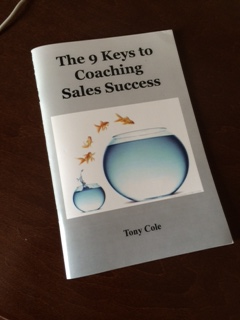In every sales training and coaching program we work with individuals to help them write and deliver their phone scripts, value propositions and elevator pitches. These are important components for salespeople to differentiate themselves in a crowded marketplace. And this exchange should begin the relationship on the right foot by getting the audience engaged.
Here is the approach I use when calling on executives that fit our ideal prospect profile:
Hello John, this is Tony Cole. (pause)
Yes Tony, how can I help you?
Well John, I’m certain of two things: 1. You were not sitting by your phone today waiting for a call from me and 2. If you are like many of our clients there is currently a lot of pressure and concern about making revenue and budget numbers.
Pause – and wait for a response.
Can I tell you why I called? Sure.
Our clients are those that recognize that their current sales structure is perfectly designed for the results they are getting today. And today the results may not be enough to make budget projections. I’m calling to find out how much you, as president of the company can relate to that scenario. Pause. Can I ask you a question?
In a word how would you describe the overall results of your company as it relates to taking the full advantage of the opportunity in your markets? (Assume the prospect says, “pretty good”.)
Why just pretty good? What is missing? (Engagement begins)
You must understand the game
Years ago, one of the lead execs from our client Key Bank shared an article called, “What it takes to be a Coach”. It began with You Must Understand the Game.
At the time, most did not understand that the ‘game’ is the game of selling. Managers and internal trainers must really understand the game of selling. Unless internal trainers have strapped a headset on, make hundreds of dials, asked for introductions, been rejected, sold big cases and started with small sales, then they cannot understand the game. It would be like taking flying lessons from a pilot trainer that did all of their flight learning in a simulator. Would you want them as your flying coach?
Most sales managers end up in their manager role because they were good to great salespeople and the company was looking to replace a current position.:
Rarely if ever does that person go through an intense, fully integrated sales training development program to help them effectively execute the required skills of an effective coach.
As an example, in the script above an effective coach will teach their salespeople to get a prospect involved in the conversation as quickly as possible. This is done by executing two steps:
- Saying your name and then being quiet
- Informing the listener that it may not make sense for the call and ask for permission to proceed
Ideally, the prospect gets involved in the conversation within 3 seconds and then gives the salesperson permission to make their value proposition or elevator pitch. That takes coaching knowledge and skill. You must know the game.
Peter Jensen is an Olympic coach from Canada and author of the book “The Third Factor”. I met Peter at Bill Ekstrom’s EXSELL Conference many years ago. He states that the first two factors for success in anything are nature and nurture. The Third Factor, specific to coaching, is:
You must have a coaching bias.
This is what it takes to be successful at coaching: you must love coaching and the game of selling. You must thrive on developing others to be the best versions of themselves. It must be about helping others gain the spotlight, success and financial rewards or a job well done. It requires sacrificing ego and the need to be right for the other person to discover their path, develop their skills and become the expert.
There are assessments in the marketplace to help people identify if they have what it takes. We use Objective Management Group’s Sales Manager Evaluation. Three key findings are identified and scored:
- The Will to be successful specifically in the role of manager or sales leader
- The Sales Manager DNA
- The Sales Manager Competencies
The evaluation provides an index percentage that tells the evaluated sales manager how they rank against other who have taken the evaluation. If their percentage is 80%, they are better than 80% of the managers who have taken the evaluation. Our 20+ history has verified that most sales managers have less than 10% of the skills needed to be an effective sales coach.
In summary, most sales managers struggle to get their salespeople to perform for one of the following reasons:
- The manager doesn’t have what it takes - the skills - to be good at the job
- The manager doesn’t take the time or doesn’t have the bandwidth to handle the job and spend appropriate time coaching
- There isn’t a consistent ‘Sales Managed Environment’ to execute to so that day in and day out, it’s a different process.
We may well be entering into a new reality when it comes to sales and business success moving forward. In order to stay ahead of the curve, and competition, companies need salespeople who are as can differentiate themselves in a virtual environment. They need sales managers or coaches with a coaching bias who can monitor and track each individual’s sales activities, coach, and hold them accountable to behaviors that will produce revenue.








